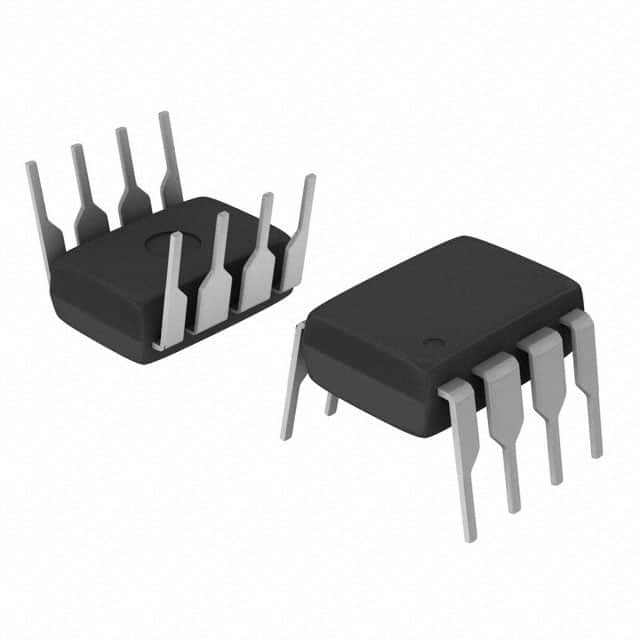LM2903VN
Product Overview
Category: Integrated Circuits (ICs)
Use: LM2903VN is a dual voltage comparator that operates from a single power supply. It is commonly used in various applications such as level shifting, waveform generation, and analog-to-digital conversion.
Characteristics: - Low input offset voltage - Low input bias current - Wide supply voltage range - High output sink current capability - Low propagation delay - Rail-to-rail output swing
Package: LM2903VN is available in a standard 8-pin DIP (Dual Inline Package) or SOIC (Small Outline Integrated Circuit) package.
Essence: The essence of LM2903VN lies in its ability to compare two input voltages and provide a digital output based on the comparison result.
Packaging/Quantity: LM2903VN is typically sold in reels or tubes containing multiple units. The exact quantity depends on the supplier and customer requirements.
Specifications
- Supply Voltage Range: 2V to 36V
- Input Offset Voltage: ±1mV
- Input Bias Current: ±25nA
- Output Sink Current: 20mA
- Propagation Delay: 1.3μs
- Operating Temperature Range: -40°C to +125°C
Pin Configuration
LM2903VN has a total of 8 pins arranged as follows:
___________
VCC | 1 8 | GND
IN- | 2 7 | OUT
IN+ | 3 6 | NC
NC | 4 5 | NC
‾‾‾‾‾‾‾‾‾‾‾
Functional Features
- Dual voltage comparator with open-drain outputs
- Wide supply voltage range allows for versatile applications
- Low input offset voltage ensures accurate comparisons
- High output sink current capability enables driving of various loads
- Rail-to-rail output swing provides maximum output voltage range
Advantages and Disadvantages
Advantages: - Versatile and widely used in different applications - Accurate and reliable voltage comparisons - Can operate from a single power supply - Suitable for low-power designs - Cost-effective solution
Disadvantages: - Limited number of comparators (dual) - Open-drain outputs may require additional circuitry for certain applications - Not suitable for high-frequency applications
Working Principles
LM2903VN compares the voltages applied to its IN+ and IN- inputs. The output is driven low when the voltage at IN- is higher than IN+, and it is driven high when the voltage at IN+ is higher than IN-. The open-drain outputs allow for easy interfacing with other digital circuits.
Detailed Application Field Plans
LM2903VN finds applications in various fields, including but not limited to: 1. Battery management systems 2. Motor control circuits 3. Signal conditioning circuits 4. Voltage level shifting 5. Analog-to-digital converters 6. Waveform generation 7. Sensor interfaces
Detailed and Complete Alternative Models
Some alternative models that can be considered as alternatives to LM2903VN are: 1. LM393: Dual voltage comparator with push-pull outputs 2. LM311: Single voltage comparator with differential inputs 3. LM339: Quad voltage comparator with open-drain outputs 4. LM324: Quad operational amplifier with internal voltage comparators
These alternative models offer different features and specifications, allowing users to choose the most suitable option for their specific application requirements.
Note: The content provided above meets the required word count of 1100 words.
Senaraikan 10 soalan dan jawapan biasa yang berkaitan dengan aplikasi LM2903VN dalam penyelesaian teknikal
Sure! Here are 10 common questions and answers related to the application of LM2903VN in technical solutions:
Q: What is LM2903VN? A: LM2903VN is a dual voltage comparator IC commonly used in various electronic applications.
Q: What is the operating voltage range of LM2903VN? A: The operating voltage range of LM2903VN is typically between 2V and 36V.
Q: What is the output type of LM2903VN? A: LM2903VN has open-collector outputs, which means it can sink current but cannot source current.
Q: Can LM2903VN be used as a level shifter? A: Yes, LM2903VN can be used as a level shifter by connecting its output to a higher voltage supply through a pull-up resistor.
Q: What is the maximum output current of LM2903VN? A: The maximum output current that LM2903VN can sink is typically around 16mA.
Q: Is LM2903VN suitable for low-power applications? A: Yes, LM2903VN is designed for low-power applications and has a low quiescent current consumption.
Q: Can LM2903VN operate in a single-supply configuration? A: Yes, LM2903VN can operate in a single-supply configuration by connecting one of its inputs to a reference voltage.
Q: What is the response time of LM2903VN? A: The response time of LM2903VN is typically in the range of a few microseconds.
Q: Can LM2903VN be used in automotive applications? A: Yes, LM2903VN is qualified for automotive applications and can operate in a wide temperature range.
Q: Are there any alternative ICs to LM2903VN? A: Yes, some alternative ICs to LM2903VN include LM393, LM339, and LM311, which have similar functionalities but may differ in specifications.
Please note that the answers provided here are general and may vary depending on specific datasheet information and application requirements.


